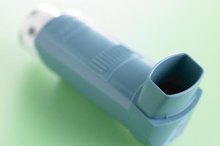What does fact checked mean?
At Healthfully, we strive to deliver objective content that is accurate and up-to-date. Our team periodically reviews articles in order to ensure content quality. The sources cited below consist of evidence from peer-reviewed journals, prominent medical organizations, academic associations, and government data.
- U.S. National Library of Medicine, National Institutes of Health: Albuterol Inhalation
- U.S. National Library of Medicine, National Institutes of Health: Levalbuterol Oral Inhalation
- U.S. National Library of Medicine, National Institutes of Health: Arformoterol Oral Inhalation
- U.S. National Library of Medicine, National Institutes of Health: Formoterol Oral Inhalation
- U.S. National Library of Medicine, National Institutes of Health: Ipratropium and Albuterol
The information contained on this site is for informational purposes only, and should not be used as a substitute for the advice of a professional health care provider. Please check with the appropriate physician regarding health questions and concerns. Although we strive to deliver accurate and up-to-date information, no guarantee to that effect is made.
Drugs Used in Nebulizers
Prescribed nebulizer medications come in unit dose vials and multidose bottles. Unit dose vials come in sealed foil pouches and are easy to use; simply break off the top of the plastic vial and pour the premeasured and mixed medication into the nebulizer reservoir cup.
Nebulizers are small handheld devices that use compressed air or oxygen, or an air compressor to produce an aerosol from the liquid medication in the nebulizer reservoir cup. Nebulizer medication can relieve bronchospasms, wheezing, and coughing and reduce inflammation of the airway. Drugs used in nebulizers include short-acting beta-2 agonists, long-acting beta-2 agonists, combination drugs and corticosteroids.
Short-Acting Beta-2 Agonists
The two short-acting beta-2 agonist nebulizer medications on the market include albuterol sulfate and levalbuterol hydrochloride. Albuterol sulfate, packaged under the brand name of AccuNeb, comes in a 0.63 mg and a 1.25 mg dose vial. This medication is manufactured by Dey, L.P. Levalbuterol hydrochloride, sold under the brand name Xopenex, is available in 0.31 mg, 0.63 mg, and 1.25 mg vials. Levalbuterol is manufactured by Sepracore, Inc. and should not be mixed with other nebulized medications.
Short-acting beta-2 agonists are a class of quick relief drugs used to treat asthma and other pulmonary diseases by relaxing the smooth muscles in the airway within a relatively short period of time. Albuterol sulfate and levalbuterol hydrochloride are U. S. Federal Drug Administration-approved generic medications.
- The two short-acting beta-2 agonist nebulizer medications on the market include albuterol sulfate and levalbuterol hydrochloride.
- Albuterol sulfate, packaged under the brand name of AccuNeb, comes in a 0.63 mg and a 1.25 mg dose vial.
Long-Acting Beta-2 Agonists
Albuterol Side Effects in Toddlers
Learn More
The two long-acting beta-2 agonist drugs on the market include arformoterol tartrate and formoterol fumarate. Arformoterol tartrate, packaged under the brand name of Brovana, is sold in a 15 mcg dose vial and manufactured by Sepracor Inc. Formoterol fumarate is packaged under the brand name of Perforomist and comes in a 20 mcg vial. Arformoterol tartrate and formoterol fumarate do not have U.S. Federal Drug Administration-approved generic medications.
Combination Nebulizer Drugs
Ipratropium bromide and albuterol sulfate are bronchodilators used to prevent and treat bronchospasms. These drugs are combined and packaged under the brand name of DuoNeb. A DuoNeb contains 0.5 mg of ipratropium bromide and 3.0 mg of albuterol sulfate premeasured and premixed in a single vial 5.
Corticosteroid
Alternatives to Spiriva
Learn More
Budesonide, a corticosteroid, prevents wheezing and shortness of breath. Budesonide should not be mixed with other nebulized medications. Budesonide, packaged under the brand name of Pulmicort Respules, is sold in 0.25 mg, 0.5 mg and 1 mg dose vials and is manufactured by AstraZeneca.
Related Articles
References
- U.S. National Library of Medicine, National Institutes of Health: Albuterol Inhalation
- U.S. National Library of Medicine, National Institutes of Health: Levalbuterol Oral Inhalation
- U.S. National Library of Medicine, National Institutes of Health: Arformoterol Oral Inhalation
- U.S. National Library of Medicine, National Institutes of Health: Formoterol Oral Inhalation
- U.S. National Library of Medicine, National Institutes of Health: Ipratropium and Albuterol
Resources
Writer Bio
Based in Atlanta, Valerie Liles has been writing about landscape and garden design since 1980. As a registered respiratory therapist, she also has experience in family health, nutrition and pediatric and adult asthma managment. Liles holds a Bachelor of Arts in journalism from Colorado State University and a Master of Science in technical communication from the University of Colorado.








